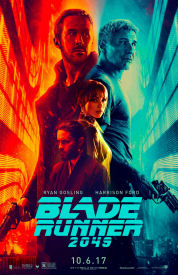 At the critics screening of Blade Runner 2049, the long in coming sequel to Ridley Scott’s classic 1982 science-fiction noir, a publicist read out a letter from director Denis Villeneuve asking us writers to not mention in our reviews a long, laundry list of elements from the film. I can certainly sympathize with any director who hopes to keep the surprises of their films under wraps until the film is actually playing to audiences in theaters. In this day of near instant dissemination of spoilers online it can be a daunting task. But while Villeneuve’s request included a number of surprises and twists that I wouldn’t even think about revealing, it also featured many more elements, including some things that are revealed in the first minutes of the film.
At the critics screening of Blade Runner 2049, the long in coming sequel to Ridley Scott’s classic 1982 science-fiction noir, a publicist read out a letter from director Denis Villeneuve asking us writers to not mention in our reviews a long, laundry list of elements from the film. I can certainly sympathize with any director who hopes to keep the surprises of their films under wraps until the film is actually playing to audiences in theaters. In this day of near instant dissemination of spoilers online it can be a daunting task. But while Villeneuve’s request included a number of surprises and twists that I wouldn’t even think about revealing, it also featured many more elements, including some things that are revealed in the first minutes of the film.
So with my hands metaphorically tied behind my back, I believe I can at least safely reveal the following –
- The movie has characters. They are played by actors, who are mostly quite good.
- Some of these characters are blade runners, police officers who hunt down rogue androids that can pass as human.
- Many of these characters exchange dialogue with other characters.
- The movie takes place in the year 2049.
- The movie is two hours and forty minutes long. Although it has a very deliberate pace, the film doesn’t really feel that long.
Snark aside, Blade Runner 2049 is a minor masterpiece of science-fiction. It may not rank quite as high as Scott’s original film, but Villeneuve gets pretty close. The two films certainly work together as a piece. Cinematographer Roger Deakins captures Jordan Cronenweth’s style from the original with ease, making virtually every shot a work of art you could just hang on a wall. Hans Zimmer and Benjamin Wallfisch’s score recreates the aural soundscape that New Age composer Vangelis created for the first film.
The amazing dystopic world building that Scott created for his film is expanded on here, showing a logical progression over the three decades that have passed in the film’s world. And this expansion extends to the new film’s themes, further exploring the idea from 1982’s Blade Runner of what can make someone human. Blade Runner 2049 also explores the original movie’s idea that an artificially intelligence synthetic person could also be considered human for reasons beyond just biology. In all these things, the film is a worthy followup.
However, there is one thing that I find myself balking at with Blade Runner 2049, and I dare say it ventures close to the spoilers that Villeneuve wanted reviewers to avoid. One of the great elements of Scott’s original film is that its ending was constructed in such a way as to be read with a couple of different interpretations. It was a great way for fans to bond, discussing for hours the various possibilities offered in the film’s final reel. But certain elements in Blade Runner 2049 destroy that ambiguity, forcing just one interpretation onto that ending. And while there is plenty to recommend in the new film, I find myself just a little saddened that we lost that ambiguity that made the original film the enuring classic that it is.





